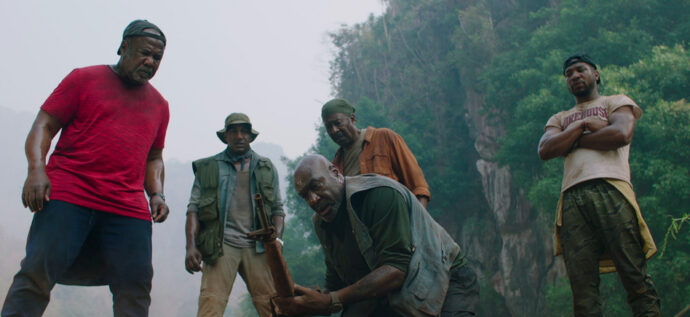When Spike Lee’s Da 5 Bloods first starts, there’s a montage. It begins with the words of Muhammad Ali, one of the most prominent Black critics of the Vietnam War. As Marvin Gaye begins to play, it’s a stunning series of archival footage of both the Vietnam War and the Civil Rights Movement, and how the two intertwined. Figures like Angela Davis speak. Footage from the Kent State shooting is shown. It of course wasn’t intentional, but as Da 5 Bloods releases just a couple weeks before the unfortunate deaths of George Floyd, Breonna Taylor, and Ahmaud Aubery, it truly makes this Netflix release and its themes all the more powerful.
Looking at the horrors of Vietnam and America’s treatment of Black people, Spike Lee delivers a passionate film that deftly combines genres and themes into one glorious package.
A Seamless Genre Blend
As a film, Da 5 Bloods combines a wide variety of subjects and genres. Action, adventure, comedy, drama, satire. No stone is left unturned here, and Lee manages to blend it all together perfectly. After the introductory montage, the film details the true storyline. A group of four Black Vietnam vets return to Vietnam on a quest for treasure. In the late 60s, along with their KIA friend Norman (Chadwick Boseman), they discovered a set of gold bars, and decided years later, they would return to find the treasure they left behind. Yet as these four men find themselves returning decades later, on a quest to find Norman’s remains and some buried treasure, the memories, trauma, and legacy of the Vietnam War still haunts them. And fourty years later, not everybody has stayed the same
Combining a treasure hunt with a film about the impact of Vietnam on Black soldiers could have been difficult. However, thanks to Lee’s passion for cinema, and a great screenplay, it really works. There’s a smart progression to each scene, building on top of one another. Every moment ties into the struggles of each character, and the struggles the war had on both sides. Black GIs were forced to fight for a country that hates them. Vietnamese citizens were massacred by the United States, losing their family.
The film showcases these horrors, attacking the American government for letting this happen. For forcing their country into this war, and for killing innocent Vietnamese civilians. For creating these divisions that still haunt millions. Each moment is connected to the sad, but true fact the Vietnam War and racism hasn’t gone away. In fact, it might not ever go away. It’s downright harrowing stuff, and Lee understands the tragedy of it all.
Bloods Don’t Die, They Multiply
The film only further pushes the horrors of the war and racism toward Black people with a memorable, layered, and powerful set of characters. The anchor of it all is Delroy Lindo as Paul, a Trump supporter stricken with PTSD by the War. Despite Paul’s actions, his personal demons and insecurities make it understandable and tragic in a way. Paul lost everything in the war, and he never really recovered from that.
Lindo is fantastic here. He brings the needed sympathy for Paul and showcases the tragedy he goes through. One particular moment where he monologues to the audience is especially brutal. He’s at his best when he interacts with his son, played by Jonathan Majors. You can see the friction and love the two share with one another, and their interactions are some of the film’s highlights.
Of course the supporting cast also shine here, with all of them having their own stories to deal with. Otis, played beautifully by Clarke Peters, has a beautiful story involving him and an old Vietnamese flame. It’s very emotional, and emphasizes the cultural dissonance that comes between America and Vietnam, as well as interracial marriages. Eddie (Norm Lewis) and Melvin (Isaiah Whitlock Jr.) do not have a large subplot, but they have lively and fun personalities between all the chaos.
All the actors have fantastic chemistry. They really do feel like old friends, and they play off each other very well. Just seeing them hang out and enjoy each other’s company is delightful, which makes their further tensions and conflicts all the more tragic.
All About the Presentation
But perhaps the one element that glues the film together into the powerhouse it is comes from its presentation and style. Spike Lee directly references and homages the likes of Apocalypse Now, Treasure of the Sierra Madre, and Rambo throughout the film. There’s so much personality in these moments and it’s clear Lee has great joy reliving and recreating films he loves.
The film also uses 16mm film and a 4:3 aspect ratio for the flashbacks in the 1970s. It’s a great way to juxtapose between the past and the present, and it leads up to an beautiful climax where the two styles merge. It brings so much character to a film that already has so much going for it.
To Sum Up…
Da 5 Bloods combines action, drama, comedy, and satire into one powerful piece. It is through the wonderful characters, great actors, and gripping story Spike Lee shows how little we’ve come and what we are still haunted by. It’s yet another great feature from the man and a perfect showcase of Lee’s immeasurable talents.
Read my BlacKkKlansman review here
